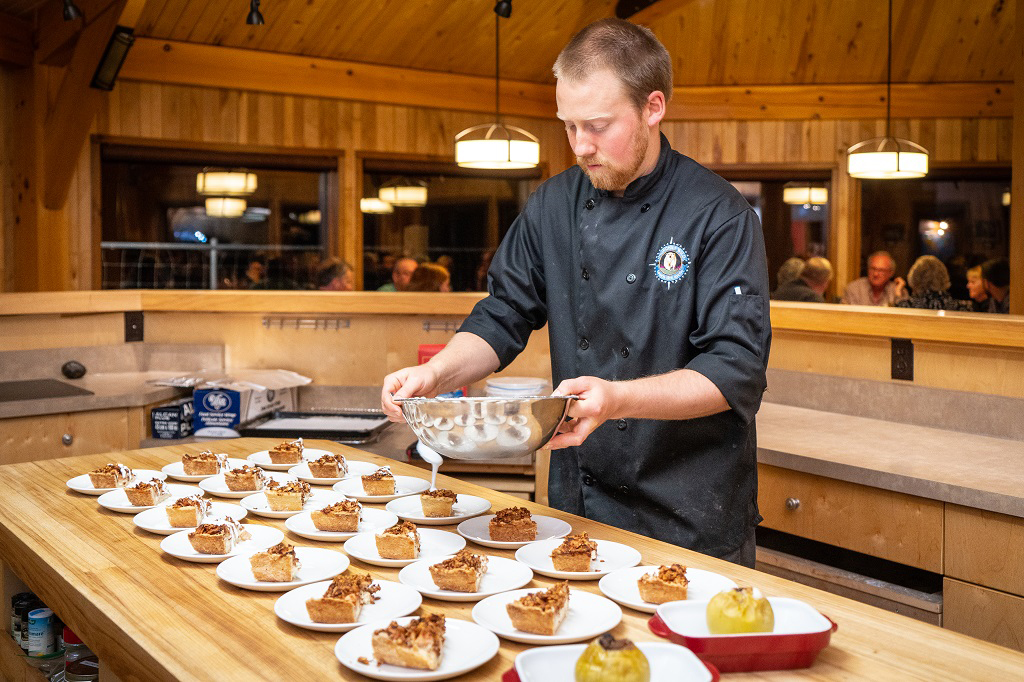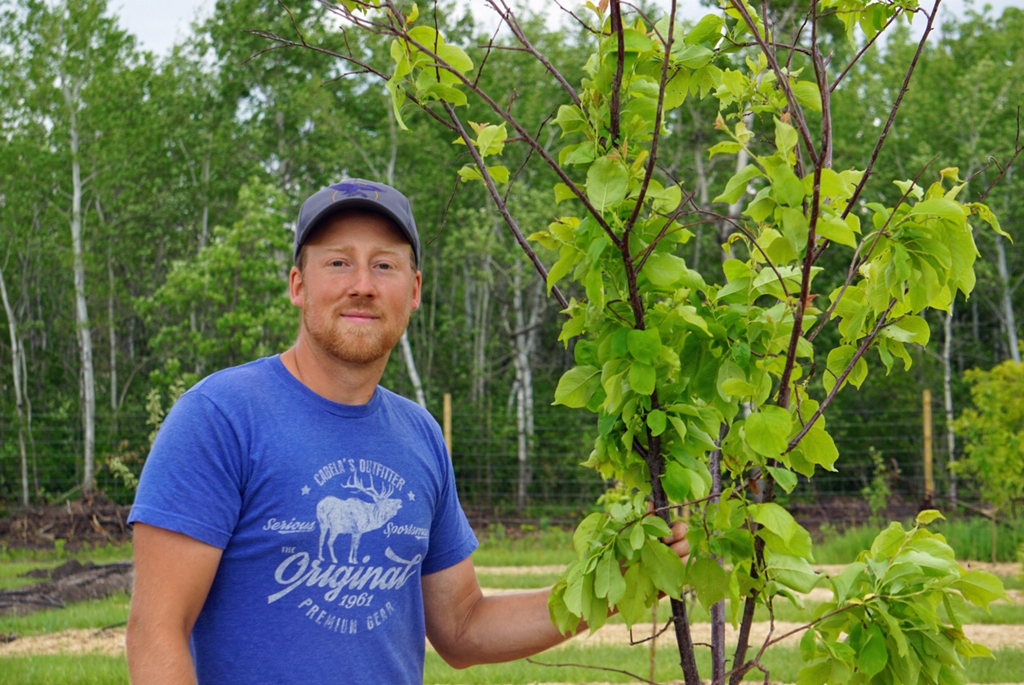
Riley Friesen. Creator of Arctic Organics.
As I watch Riley Friesen walk towards me through his freshly planted fruit grove, I’m struck by how relaxed he looks. He’s recently undertaken a massive orchard project that will supply the Churchill Wild ecolodges with fresh produce; he’s one week away from heading to northern Manitoba to be a fishing guide at North Knife Lake Lodge; and he has a young family and a burgeoning carpentry business building custom-designed furniture.
Knowing what his days must look like sends me into a mental tailspin, but he doesn’t seem to have a care in the world. Maybe I can pick up a few pointers.
Riley is a son-in-law of Mike and Jeanne Reimer, founders of Churchill Wild, a company built on hard work, innovation and dedication, all of which Riley quite clearly possesses.
This 27-year old go-getter became acquainted with Mike and Jeanne’s daughter Karli in 2004 when the Reimer family relocated from Churchill to a small town in southern Manitoba. The two attended school together and it didn’t take long before Riley found out what her parents did and began looking for an opportunity to join the team.
Riley spent his first summer at Seal River Heritage Lodge at the age of 15, helping with maintenance of the lodge and equipment. It only took one summer before he caught the Hudson-Bay-bug and got hooked on northern life. It was also around this time that he caught the love-bug and began pursuing a relationship with Karli. Throughout high school he continued to spend summers working at the lodges and, upon graduating, he spent his first full season as part of the maintenance team.
In small, family-run businesses, employees often have to jump from role to role – or even do double duty during the season. Riley is no exception. He studied culinary arts in high school, and after Churchill Wild purchased Nanuk Polar Bear Lodge he had a chance to put those skills to good use. He became the chef for the first guests at Nanuk in 2010.
Riley’s career with Churchill Wild and his relationship with Karli blossomed over the next five years. He continued to hone his culinary talents, working alongside Karli in the kitchens at both Nanuk and Seal River, while also helping with construction projects in the off-season.
In 2013, Riley and Karli got married, and after one more year in the kitchen at Seal River, the pair moved to British Columbia so Riley could study aviation mechanics. Near the end of his first year in the program, their son, Ezra, was born, and due to complications at birth, Riley decided to put his schooling on hold and move to back to Manitoba to be closer to both their families.
Throughout the next year, Riley rediscovered a love of woodworking, an interest that had been borne out of spending time in his grandfather’s shop as a child. He began making pieces to furnish and decorate the lodges and it didn’t take long before he decided to shift his focus to this pursuit.
In 2016, Riley enrolled in the Woodworking Technology program at Red River College in Winnipeg. One of his instructors saw something special in Riley’s work and recommended him for an apprenticeship program in Germany. It was an opportunity too good to pass up and so, along with Karli, Ezra and baby Zoe, Riley headed to the land of precision and efficiency for the four-month program.
While in Germany for his apprenticeship, Riley picked up many techniques and insights that he’s since incorporated into his own woodworking practice. He also learned about something else that was prevalent in that country: an emphasis on seasonal eating.
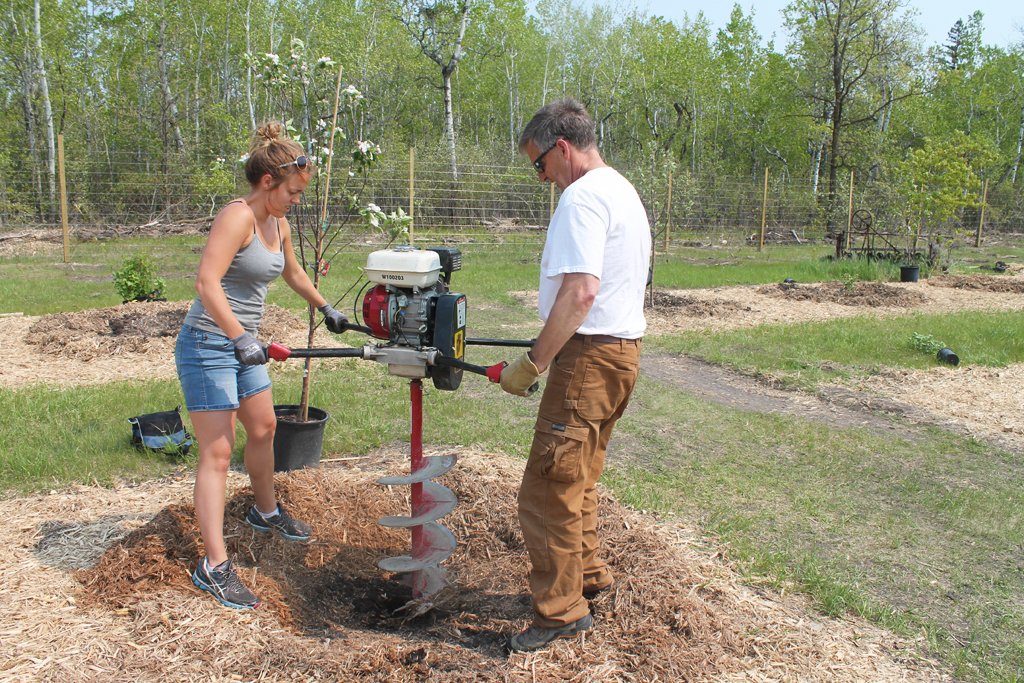
Mike Reimer and daughter Allison doing their Armageddon asteroid drilling impression.
Riley began cultivating an interest in gardening and horticulture several years ago when his parents bought a small plot of land and planted a few fruit trees. Since then he’s also built them a small greenhouse and each year he helps with the harvest and production of hand-pressed apple juice.
In 2018, when Mike Reimer had the idea to build a greenhouse at North Knife Lake Lodge, he was able to draw on Riley’s carpentry and horticultural knowledge, and also tasked him with the job. After extensive research, Riley came up with a design for a passive-solar greenhouse that could withstand the colder temperatures seen in northern Manitoba.
Three of the four walls (north, east, west) are insulated, while the south-facing window has glazing. Traditional greenhouses are glazed on all sides, which allows them to heat up during the day, and cool down at night, but in the north, cooling down could mean freezing temperatures. A passive-solar greenhouse allows it to warm up during the day, but not to get too cool inside because of the insulated walls. Additionally, barrels of water dubbed “thermal masks” were placed against the north-facing wall to store heat throughout the day and release it slowly at night to combat the cool-down effect.
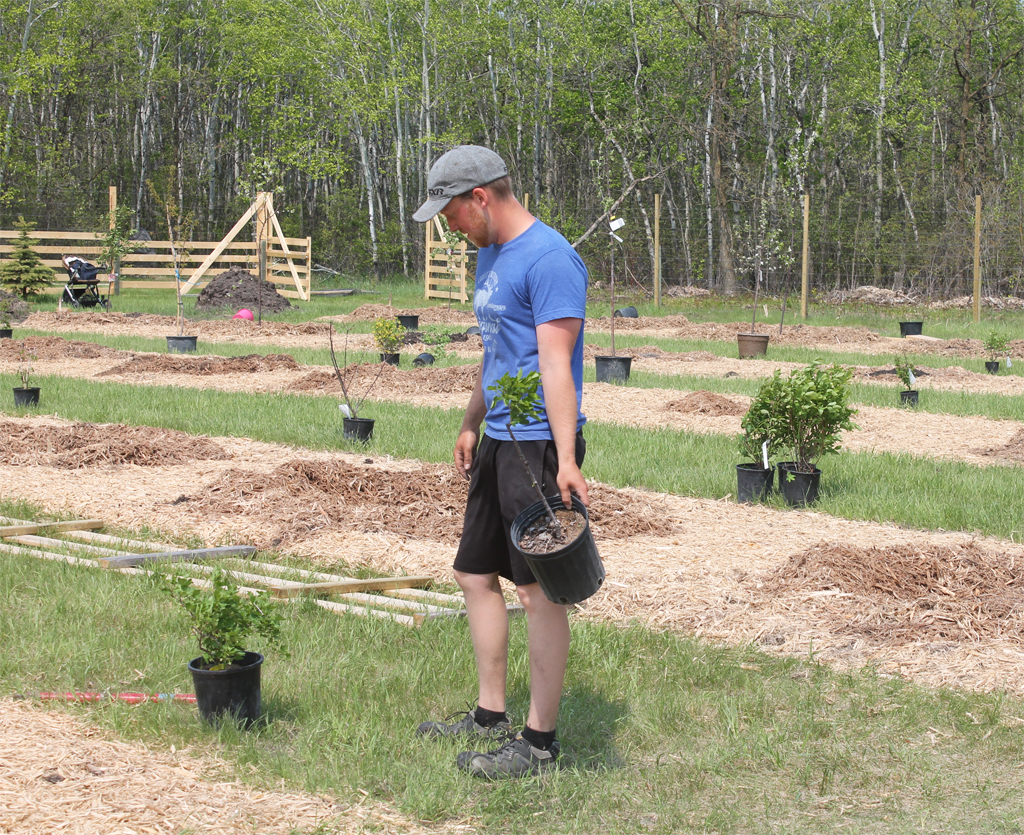
Riley talking to one of the new Arctic Organic trees.
At a size of 20’ x 30’ with four growing beds, Riley and North Knife Lake Lodge founder Doug Webber set to work planting crops that included strawberries, tomatoes, beets and lettuce, experimenting to see what would survive in the harsh environment. Though not everything performed well, the team was able to harvest enough produce to supply several groups of guests at the lodges with fresh salads.
One of the reasons Mike has been so successful is that he has an unspoken motto of, “why go small when you can go really, really big?” When he saw how well the greenhouse at North Knife turned out, and how well-received its harvest was, he began to envision the possibilities for a larger-scale operation to supply all of Churchill Wild’s lodges with fresh produce. Thus, Arctic Organics was born with a multi-year plan that would utilize a satellite greenhouse, an orchard, and gardens in southern Manitoba.
This year, Riley is focussing on the orchard, which has just been planted on Mike and Jeanne’s property in southern Manitoba. As I stare at the perfectly planted rows of trees, Riley tells me the layout is based on the principle of permaculture.
Traditional orchards are based on monoculture, where only one type of fruit tree is planted. This is good for mass production, but horrible for being able to do things organically. If one tree develops a disease, it will pass through the whole orchard like a wave. To slow down or prevent this, trees are sprayed with pesticides, which is not only bad for consumers, but also degrades the soil. Eventually the soil will just be a medium for the roots of the trees, which won’t get any nutrients from the soil, so, in turn, the soil has to be chemically fertilized to provide a source of nutrition.
Riley’s orchard doesn’t have any of the same trees planted next to, or across from, one another. Each tree has a different disease tolerance, so a plum tree will be resistant to a disease that an apple tree might not be. To further protect them, enough distance is left between identical trees so that if one tree does get sick, the disease won’t spread.
Riley also designed the orchard to be managed by one person. The various trees he’s chosen will be ready for harvest at different times, to stagger the workload and distribute the fruits of his labour throughout the season. So simple, so clever.
To date, Riley has planted apricots, 12 varieties of apple trees, along with plum and pear trees, honeyberries (an elongated blueberry), gooseberries, currants, highbush cranberries, hazelnuts, hickory, cherries, and saskatoons — 100 plants in total. Apart from the apricot trees, which succumbed to a late frost, everything else will produce fruit this year.
The last thing Riley tells me about this organic orchard design is that he’s incorporated “trap trees” to attract pests that might otherwise attack the fruit-producing trees. Sort of a sacrificial tree situation.
I asked Riley to walk me through the orchard and point out the different varieties of trees. I hear him start talking about the history of the property we’re standing on, but I get distracted by his beautiful dog, a black shepherd-collie cross with subtle white markings. At just under a year old, she has the calmest gentlest nature I’ve ever encountered in such a young dog. I can’t stop myself from bending down to give her some attention.
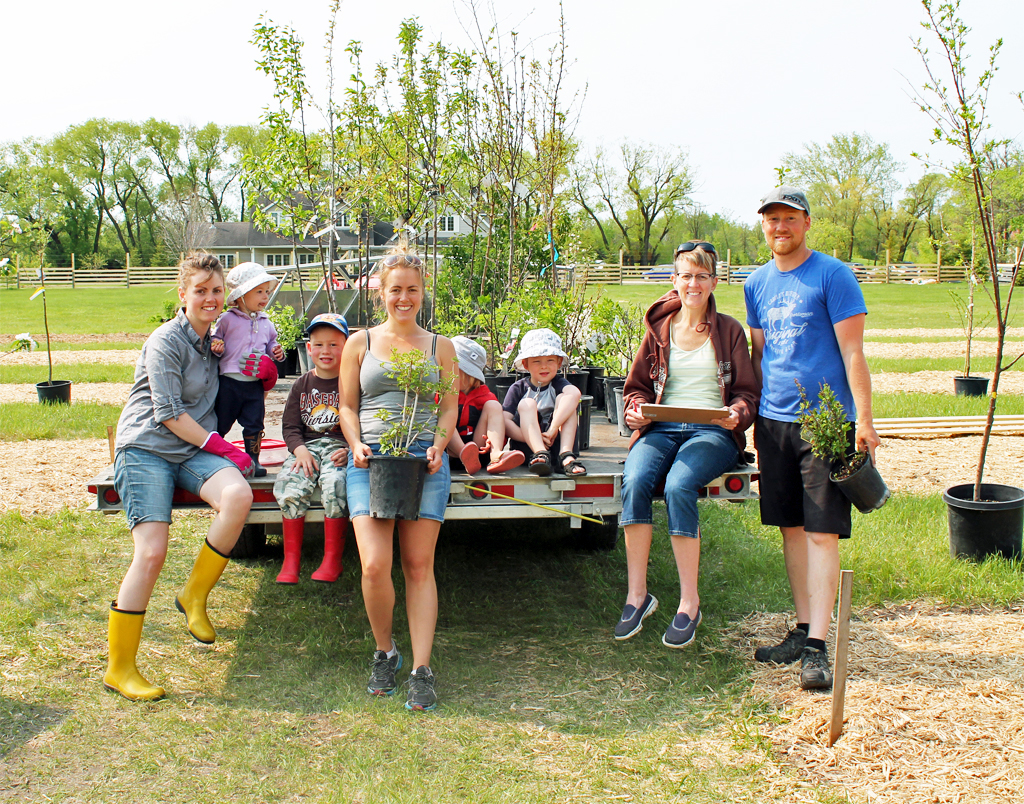
Arctic Organics is a Churchill Wild family affair!
As it turns out, in the 1960s and ‘70s, Mike and Jeanne Reimer’s land was part of a fruit farm. While much of the soil surrounding the orchard contains a high amount of clay — a recipe for water retention and disease — the soil on this land has a lot of gravel in it, which is good for drainage, so his trees should do well.
Knowing that sustainability is one of Churchill Wild’s guiding principles, Riley is working towards organic certification for the orchard, with a fertigation system he designed that will use northern seaweed harvested from the shores of Hudson Bay at our Seal River Heritage Lodge. A compost tea made from the seaweed will be diluted in the irrigation tank and delivered to the base of each tree via a series of drip lines along each row.
Traditional compost is often used to fertilize fruit trees. Farmers pile it around the base of a tree and its high nitrogen content encourages the tree to grow quickly, but this accelerated growth means the trees don’t have time to put down strong roots proportionate to their size. These trees will often have tall yet skinny trunks and be susceptible to wind damage. Seaweed is low in nitrogen and high in minerals so Riley’s trees will grow more naturally, at a slow and steady pace.
Additionally, wood mulch covers the soil around each tree and serves two purposes: it suppresses the growth of grass so that the trees aren’t competing for nutrients, and it keeps the ground cool. This is important because we often get a few unseasonably warm days in the spring, followed by a late frost. Keeping the ground cool during these warm days will prevent the trees from flowering too early in the season and subsequently dying from frost.
It’s a true labour of love. Each week, Riley goes through the orchard to check on all the trees to ensure they’re pest and disease free. He’s currently dealing with a stinkbug infestation, which he’s combating in a highly scientific way — he checks each tree and disposes of any bugs trying to invalidate his efforts. This method, though tedious, is paying off! The numbers of stinkbugs are way down since the infestation started.
Riley tells me that many of the people who have heard about his orchard are skeptical that the trees will thrive. After all, even in the southern part of the province, our growing season is quite short, and he admits that it’s a little daunting to look out across the orchard and know that he’s responsible for the care and harvest of more than 100 trees and shrubs. Though after speaking with him and hearing how carefully he selected his plants, and how much thought went into this project, I have nothing but confidence in him.
After this season, he’ll evaluate which trees performed best, and come up with a plan for next year when he’ll double the size of the orchard. There are also plans for a seating area right in the middle of all the trees, complete with a timber frame arbour covered in grapevines.
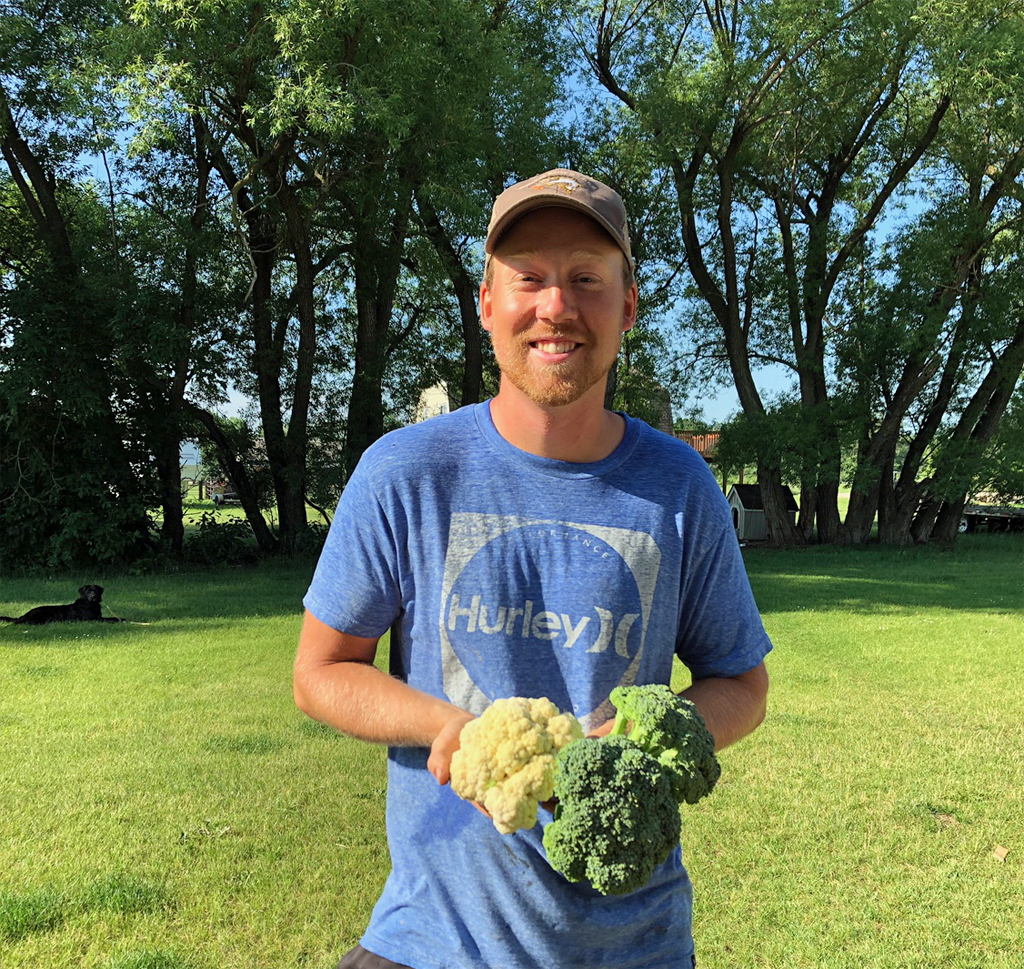
First crop! Broccoli and cauliflower!
On another part of the property, Riley shows me a plot of land where he’s planted a garden containing raspberries, arugula, butter lettuce, romaine, cabbage, broccoli, beets peppers, brussels sprouts, tomatoes and more. Next year he plans to quadruple the size of the garden and build a second, larger, satellite greenhouse to subsidize the one at North Knife Lake Lodge.
Riley is one of those individuals whose talents seem never-ending. He makes me feel like I need to up my game. Despite the breadth of his skills however, you won’t hear him boasting about what he’s accomplished so far. I have no problem saying I’m in awe of what he’s done — and will do.
For Churchill Wild.
https://youtu.be/rrTqkZo0G9s?rel=0

